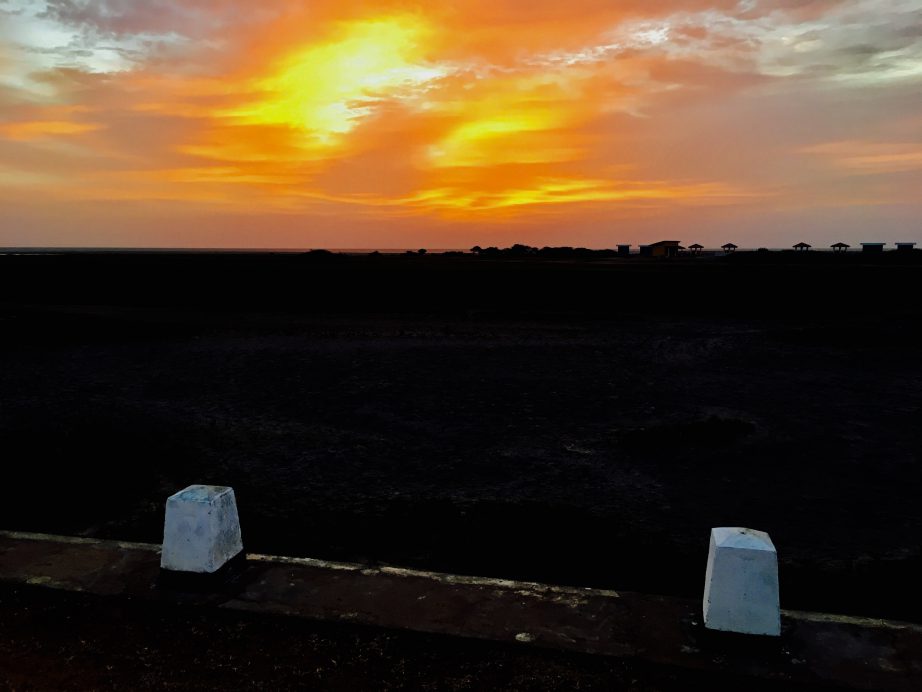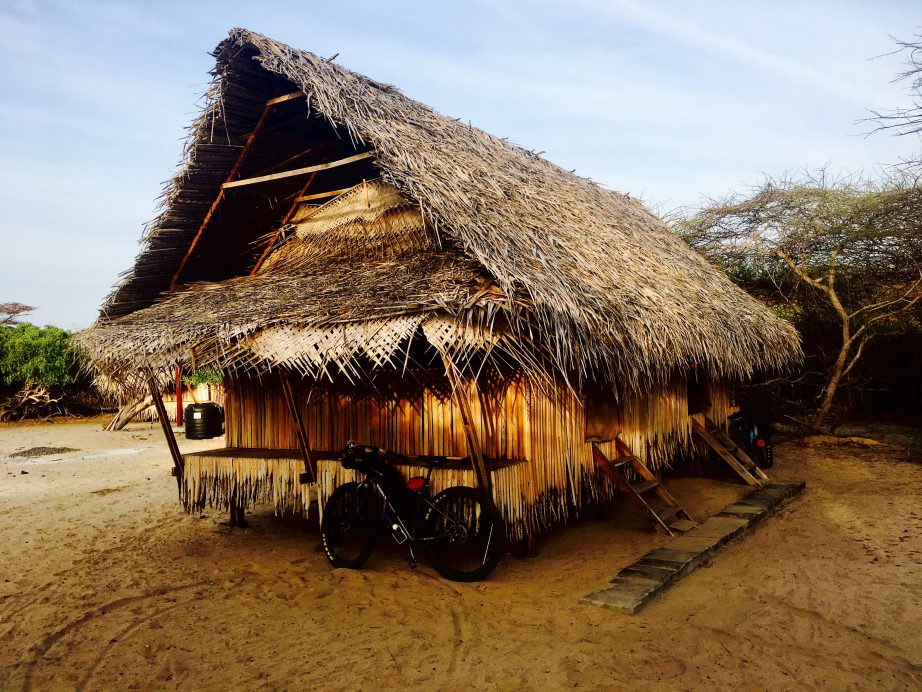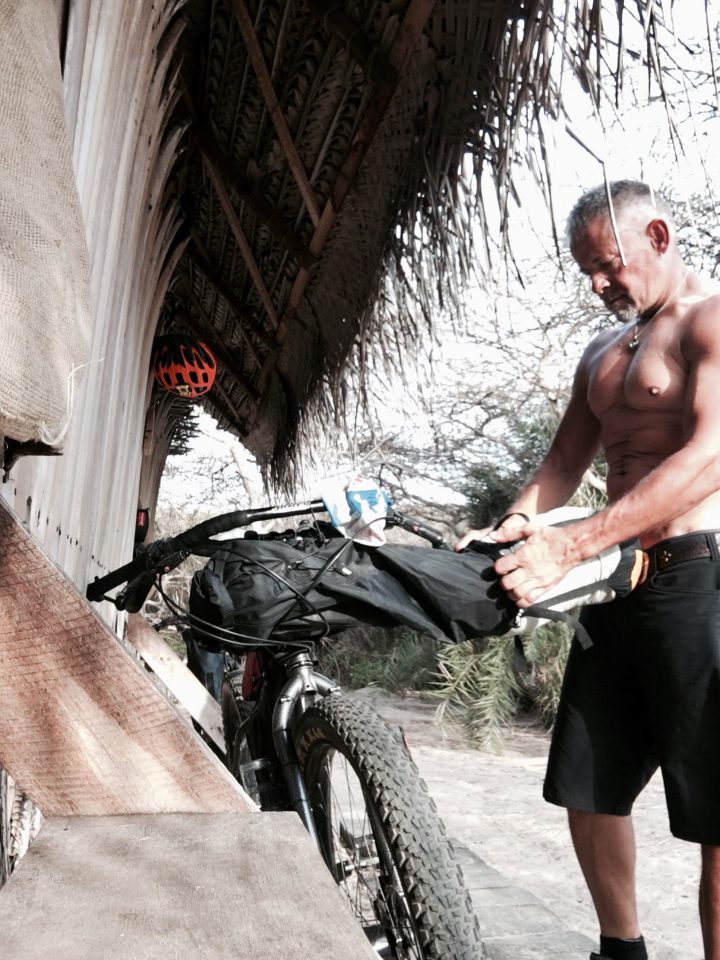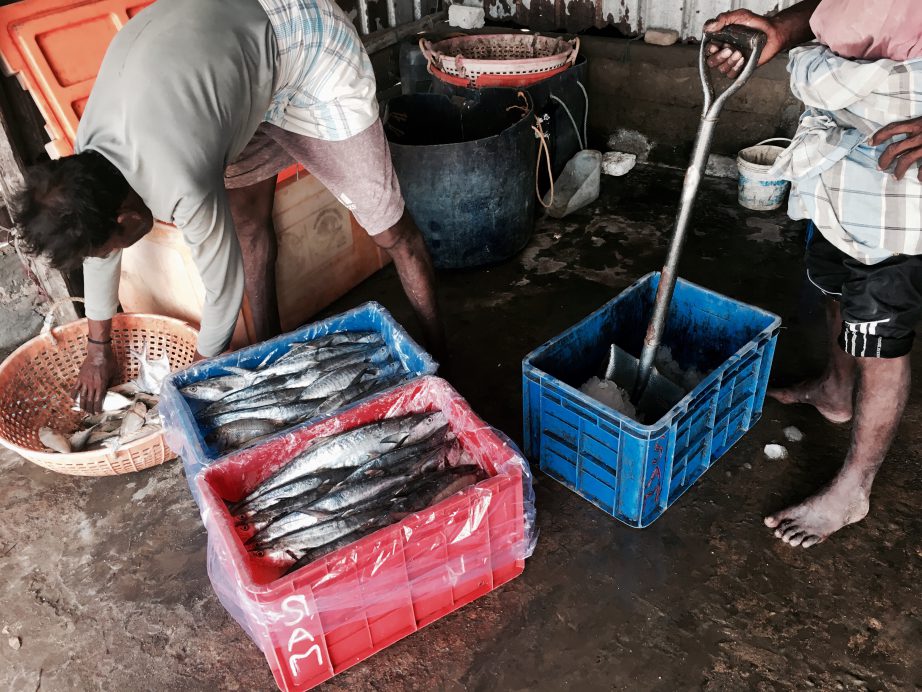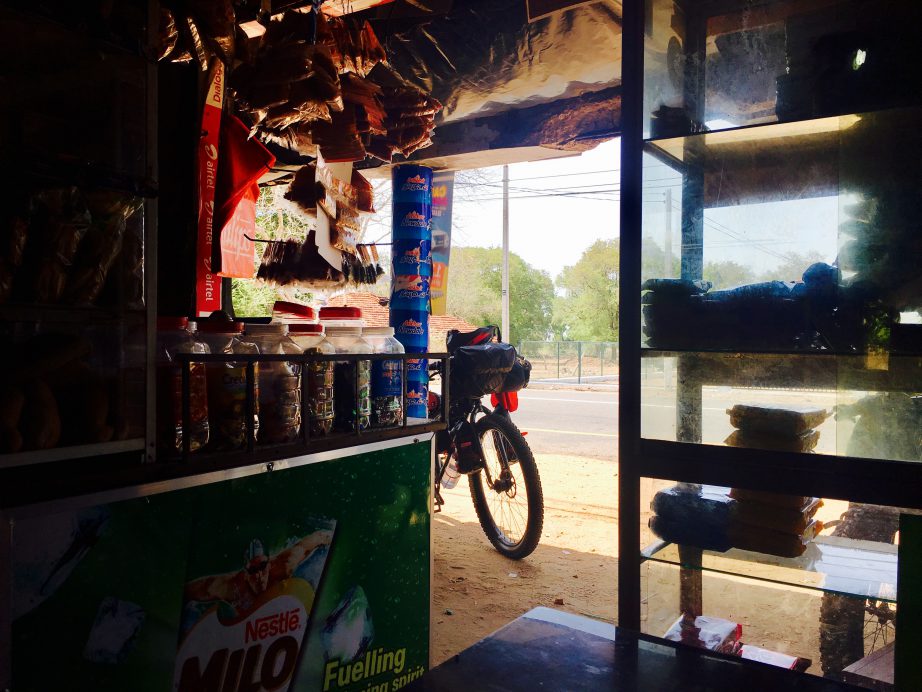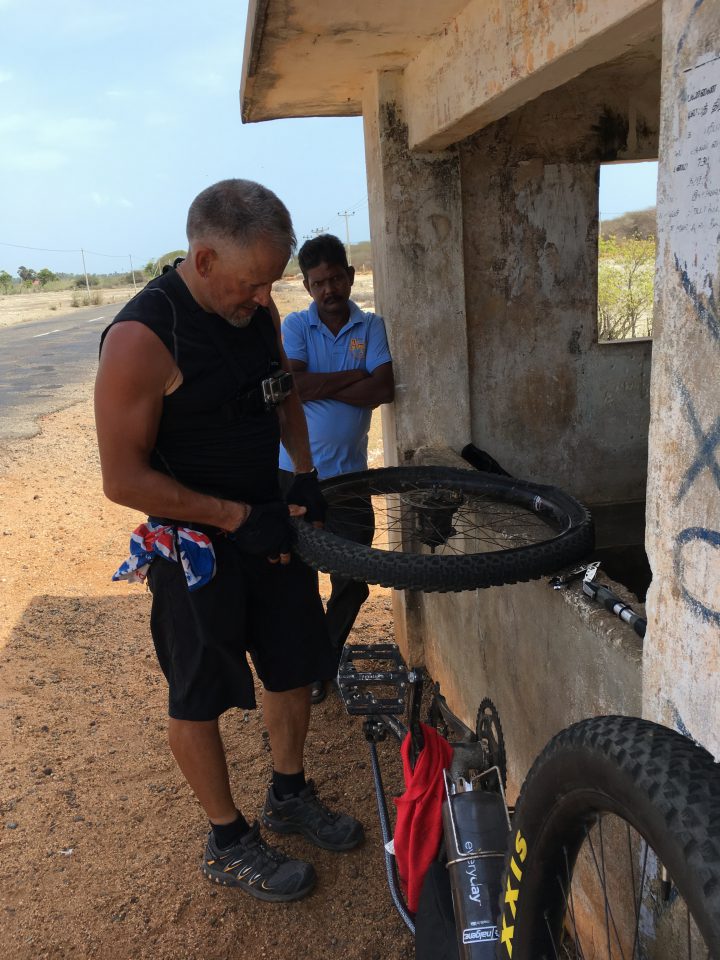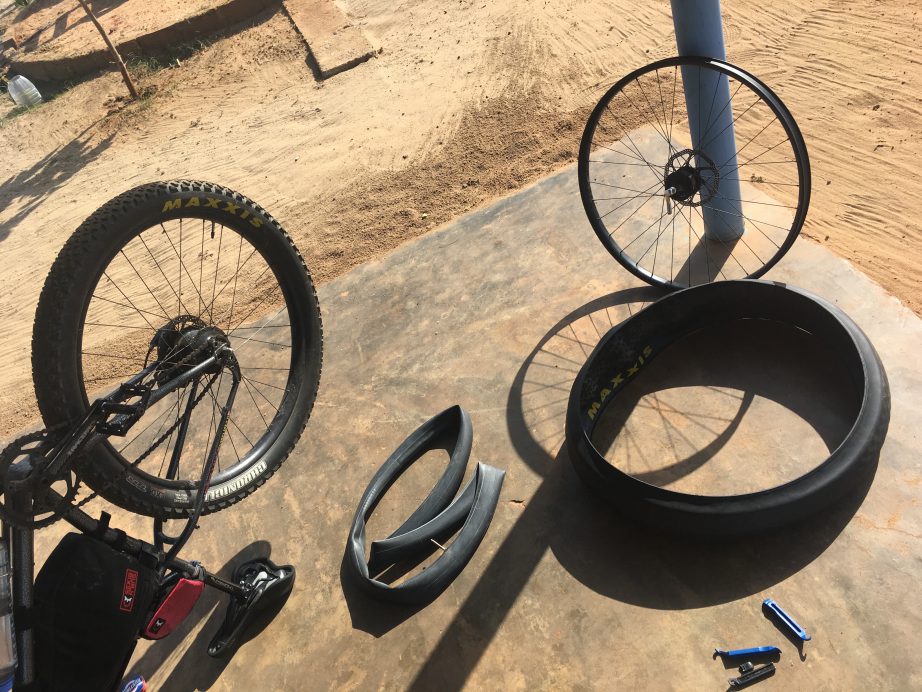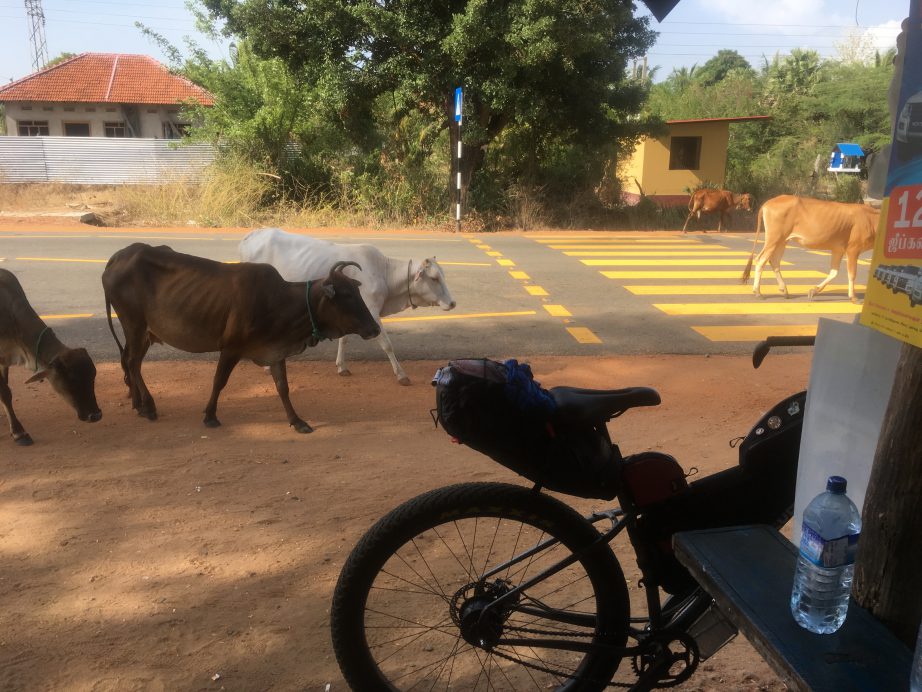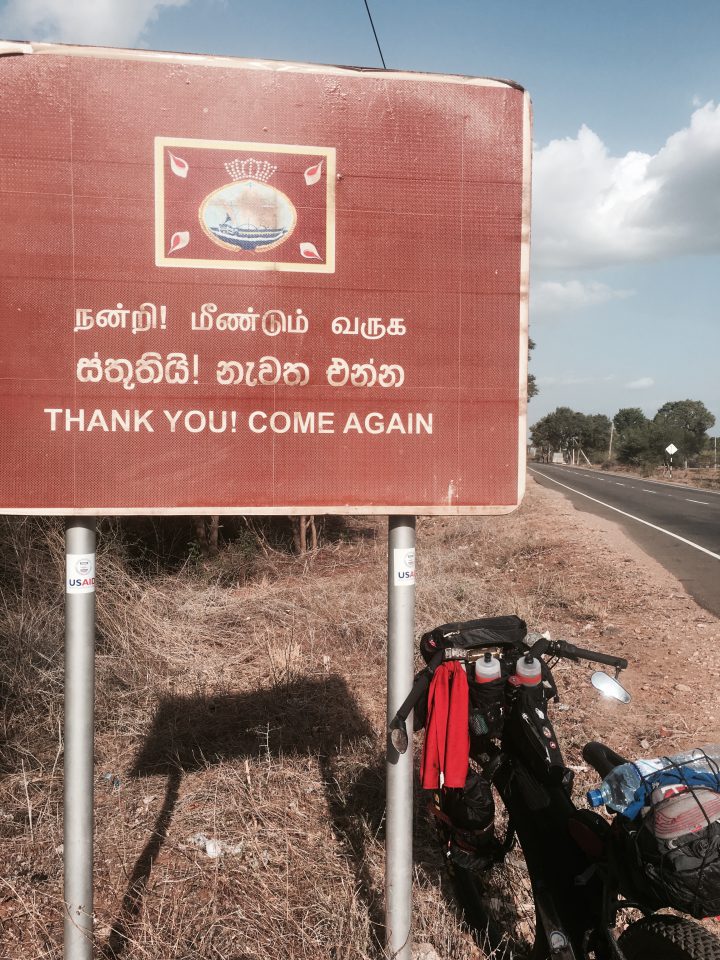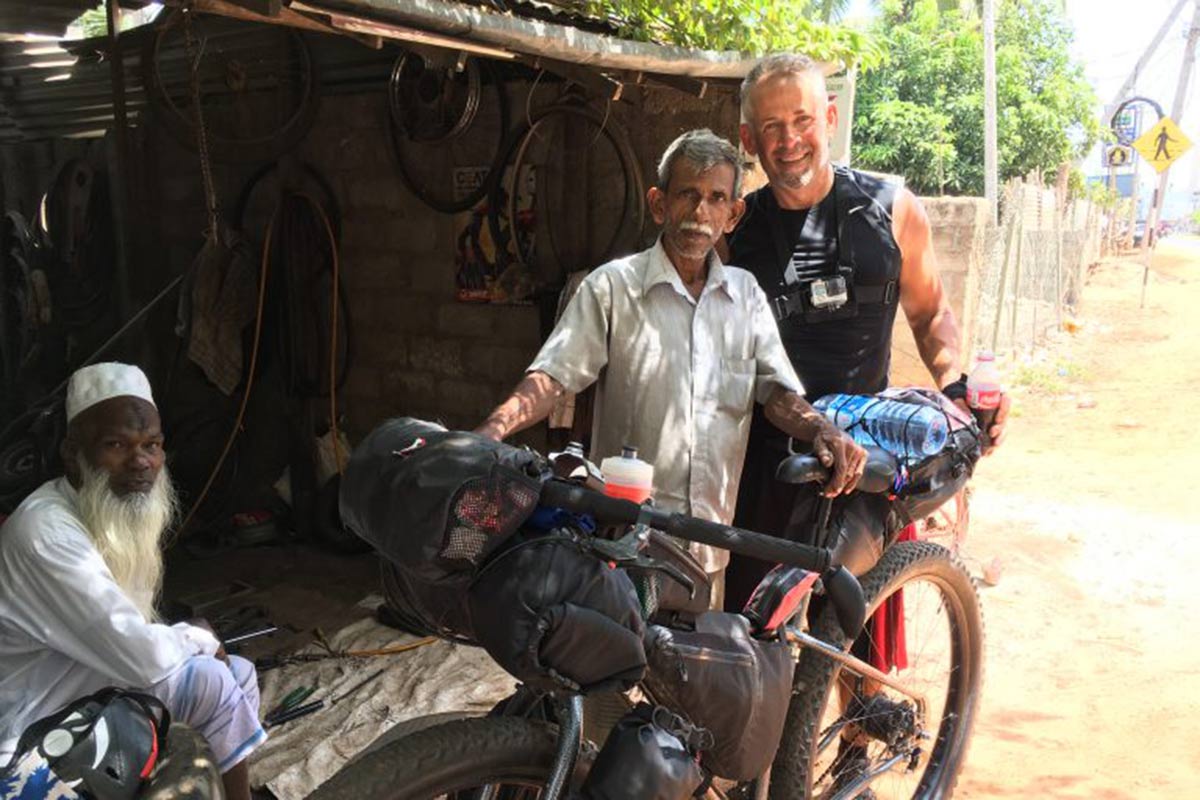Day 16: Captain's Log, Earth Date 7.22.2017
Beach encampment on the coast of Urumale, Talaimannar Village South, Mannar Island, Sri Lanka
4:30am
Loudspeakers from the local Hindu temple erupt to life, waking me up from a restless slumber on a dark Sunday morning. A recording of a woman’s voice drifts out over the Indian Ocean coastline, lulling, underscored by Eastern instrumentation. It’s the morning call to worship. The broadcast continues for another 20 minutes or so, as we drift back to sleep under the mosquito and scorpion netting. We are in a thatch hut built on stilts, Gilligan’s Island-style, that we have rented for the night. There were no other accommodations by the time we had biked to this end of the island the previous day.
5:30am
A wild peacock, nested for the night directly under our hut, lets out a loud sharp primal YAWWWWWWWP! We jump bolt upright in our beds and then laugh nervously in the dark as we hear the rest of the flock of peacocks begin to call out to each other in the growing morning light.
6:00am
I’m laying on my back staring up at the peaked thatch eaves of the hut, when suddenly a family of monkeys, screaming at each other, tears swinging, pell mell, across the rafters, disappearing back into the trees. “You can’t make this shit up,” I whisper to myself.
6:30am
I roll out of bed, slip into my sandals, and trudge 50 meters of sand over to an open-air shower to wake myself up. A cold stream of water from a small pcv pipe connected to the cistern above, guided by gravity, hits my tired face. I stare out across the empty campground at the peacocks strutting around as I wash the sweat of night from my tail feathers.
7:00am
My Siberian-Russian co-rider and I start loading up our fat bikes, getting packs battened down, checking on water supplies, etc. I do a quick cleaning and re-oil of my bike chain. After 871km of riding cross-country over the past few weeks, my bike (and my body) are showing a bit of wear. My front tire is still firm, after having had to change a flat the morning before on our way across this 35km-long island. Full tires in the morning are always a welcome sight. We pay the groundskeeper $25 for the use of the hut, and we cast off down the concrete coastal beach road, headed to have our regular morning tea, about a 15km ride away.
7:05am
We pass several fishermen headed towards their boats beached near Adam’s Bridge, the fabled underwater chain of island stepping stones that connect India to Sri Lanka. They carry crates of ice to store their catch at the end of the day, and fishing nets on their heads. They are fresh from worship at the mosques and temples, hoping for a good day’s harvest. They wave curiously at us as we go by.
7:08am
The sweet scent of incense from the local Catholic Church wafts through our noses as we wind our way through the village. Mothers, dressed in beautiful multicolored garments, walk their small sons back home from worship.
7:45am
We arrive in the intensifying morning heat at a small storefront cafe to order up tea and a few Sri Lankan savory breakfast donuts. There are no doors on any storefronts in any of these food establishments. No A/C. No lights except for daylight. After your eyes adjust to the gloomy interior, you duck under bags of dried peppers, bunches of bananas and packets of instant Nestle drink powder hanging from the low ceiling, to find an open spot at the 1-2 small tables that are set up inside. People stare quietly at us, their conversations suddenly suspended by our presence. A dusty glass-case fridge filled with cold bottles of Coke hums in the corner. Flies buzz around, landing on everything. Young men gather excitedly around our bikes outside. Old men squeeze and poke at our fat tires with their walking sticks. All are in agreement that the two of us must be completely insane to be riding such great distances in the heat. We sit quietly at our table, sipping our tea, swatting at flies, and watching this common scene unfold outside. We pay the storekeeper 240 rupees ($1.56) for the tea, cakes, and two liters of water and head out into the heat of the day to fill up our water bottles. Saying goodbye to everyone, we mount our mechanical steeds and silently glide back down the road.
8:15am
I come across a cow, underneath a tree, munching on coconuts. “Now you know where coconut milk comes from,” I say to myself, and continue on, proud that I’ve debunked yet another conspiracy theory.
8:30am
Soon, I notice that the back end of my bike is wobbling, glide to the side and climb off. Turns out my rear tire is completely flat. I roll the bike another 100m to a bus shelter out in the middle of nowhere, nod my head to the two Hindu women inside who stare stoically back at me, and start dissembling the bike to make repairs. This requires me to remove the rear packs, water bottles, and to unload the necessary tools before turning the bike upside down to remove the rear tire. My Russian co-rider pulls up, smiles at his good fortune, and promptly pulls out his chain-cleaning supplies and goes to work on his own bike while I trouble-shoot mine. Donkeys bray and frolic in the salt flats in the distance. Curious motorcyclists and Tuk-Tuk drivers, transporting folks from the country back from church services, stop to silently watch the repairs. All are in complete agreement that the two of us must be completely insane.
9:15am
My repairs are completed. The culprit- a sharp thorn that my tire must have picked up in the dirt of the campground. The leak, however, remains elusive, as we were unable to discover it, due to the noise of traffic going by. After trying another method, having cut the top 1/3rd off of a 2L water bottle and trying to submerse the tube into the reserves, there wasn’t enough water inside (much less room) to find the leak via the underwater method. The town of Mannar is still 10km away. I put the bike back together, re-loaded it up, and limp to Mannar, stopping every 3-4 km to re-pump up the tire.
9:45am
We arrive in Mannar and ask a pair of local police officers if there is a bike shop nearby. Very little English is spoken by Tamil folk in the North and Northeast of Sri Lanka, mainly due to the cutting off of opportunities for English education during the civil war, thereby separating Tamil youth from chances to better themselves. Some of the luckier ones escaped to the UK before war broke out, and built lives for themselves there, far away from their homeland.
9:48am
A white community disaster management car pulls up (oh, how appropriate), an officer leans out the window and, in Tamil, asks the other officers if there is some sort of problem.
“Follow me,” says the driver, and we hop on our bikes and follow the white community emergency police car through the town center, then down a side street to a small dilapidated shed that is a tire repair shop. Translating for me, they describe my problem to the shop keeper.
I start to disassemble the bike…again.
10:00am
My two bad tubes have been repaired with lightening speed by the Tamil shop owner, along with a new nut for my rear axle. “Zis guy is very poor,” the Russian whispers to me, gesturing towards the meager possessions of the shopkeeper. Taking his cue, I ask for the bill. “80 rupees”. (50 cents). I hand the keeper a 1,000 rupee note ($7) and ask him to keep the change. He asks us to take his picture with me and the bike. We thank everyone all around, and we hit the road once again, for the 60km journey back onto mainland Northern Province of Sri Lanka, back into the growing desert heat.
10:15am-7:00pm
The many military installations, a common sight every 10km or so, start to become less frequent. Donkeys in the road give way back to cows once again. Buddhist shrines reappear (we haven’t seen any in the North), along with varied Hindu and Catholic shrines. Statues of Jesus, his plaster body bleeding from numerous painted on piercings, bake and steam inside glass cases set up on pedestals at every street intersection. Pretty soon, they all look the same to me. We work our way another 80km down the A14 highway that day until well after dark, passing through towns, high-fiving kids on bikes, hearing young tots yell out “bye bye!!” from their yards, and observing more folk gathered around our bikes at rest stops, agreeing that, indeed, we are insane. We quietly sip our tea and then move on.
Many hours later, we roll into a larger city, wiped from our travels, the halogen lights on our bikes blinking out into the night causing approaching Tuk-Tuks to flash their high beams at us. Crickets creak softly and the night birds call out to each other. A man cheerfully waves “hello, good morning!” to me from the shadows at the end of his driveway. Geckos chirp from the eaves of houses, as bats swoop by us, devouring the black bugs that are attracted to our lights. We pull into the dirt drive of a guest house, and begin to negotiate the boarding fee with the host.
The evening call to worship echoes out over the town, broadcast from giant loudspeakers attached to the Muslim mosque a block away. We roll our bikes into our rooms, and start to unpack.
It’s the end of a typical day, riding for a cure for cancer throughout Sri Lanka for thirty days. And its all worth every single kilometer, every single flat tire, every call to worship heard as I pedal my way towards my goal of raising $8,000 towards cancer research.
